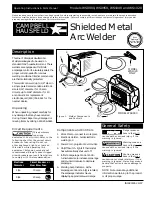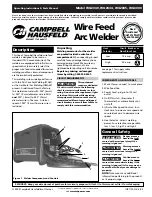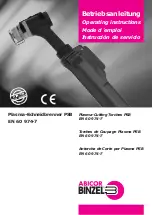
Function description
36
4.15 Other functions
4.15.1 Torch functions for fast setting of the welding currents I
1
and
I
2
Setting the welding current I
1
(before starting to weld)
Briefly (<0.5 seconds) actuating the torch trigger 1 selects the setting options for
the welding current I
1
–
the LED current I
1
[4] flashes. The value for welding
current I
1
is shown in the digital display[5]. The value can be changed by turning
the push and rotate knob [8].
By actuating the torch trigger 1 HF ignition pulses can be emitted
depending on the setting.
Setting the welding current I
2
(before starting to weld)
Briefly actuating the torch trigger 2 selects the setting options for the welding
current I
2
–
the LED current I
2
[4] flashes.
The value for welding current I
2
is
shown in the digital display[5]. The value can be changed for I
2
by turning the
push and rotate knob [8].
If no change is made to the welding current I
1
or I
2
for 2 seconds, the system
jumps back to the previously selected welding parameters. Activation is possible
from every welding parameter, for example if gas post-flow is selected.
4.15.2 Setting the welding current I
1
and I
2
with the up/down torch.
To do this the special parameter SP2 must be set to “1” (see Section
Using the up/down torch the current I
1
, I
2
can be controlled up or down before
and during welding work. The set value is shown in the digital display [5].
Turning I
1
up and down is done by actuating Up/Down (hereby the LED for
welding current I
1
flashes).
To turn I
2
up/down the welding current I
2
must be selected by actuating the torch
trigger 2 (hereby the LED for welding current I
2
flashes). Turning I
2
up and down
is done by actuating Up/Down.
The active currents I
1
or I
2
can be adjusted up and down at any time when
welding. If Up/Down is not actuated for 2 seconds, the system jumps back to I
1
–
LED current I
1
[4] illuminates).
If the welding current I
1
is adjusted up or down during pulsing the value welding
current I
2
is changed at the same ratio, this means that the perceptual
relationship between I
2
and I
1
remains constant when changes are made to I
1
(for
example starting value I
1
= 100A, I
2
= 50A results in the final values of I
1
= 200A,
I
2
= 100A).
Summary of Contents for TIGER 180 AC/DC ULTRA
Page 6: ...Introduction 6 1 2 General description Fig 1 TIGER Fig 2 TIGER with integrated Water cooling ...
Page 58: ...Circuit diagram 58 11 Circuit diagrams Circuit diagram TIGER 230 AC DC ...
Page 59: ...Circuit diagram 59 Circuit diagram TIGER 230 AC ...
Page 60: ...Circuit diagram 60 Circuit diagram TIGER 180 AC DC ...
Page 61: ...Circuit diagram 61 Circuit diagram TIGER 180 DC ...
Page 63: ...Circuit diagram 63 Circuit diagram TIGER water cooling unit ...
Page 67: ......
















































